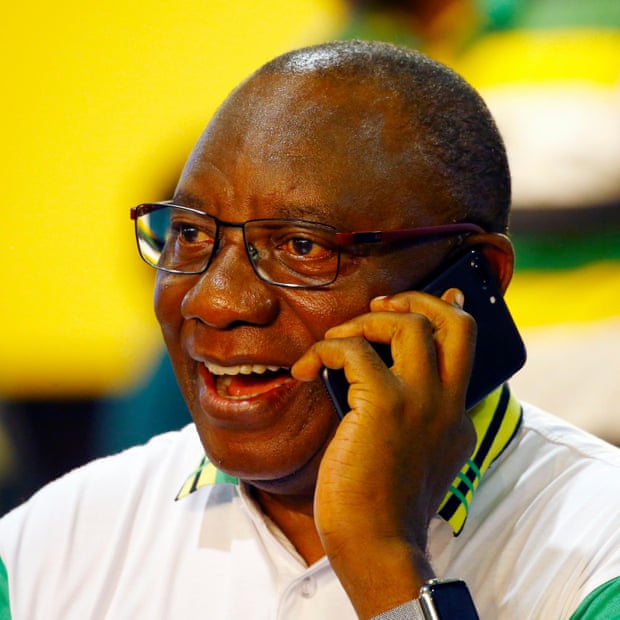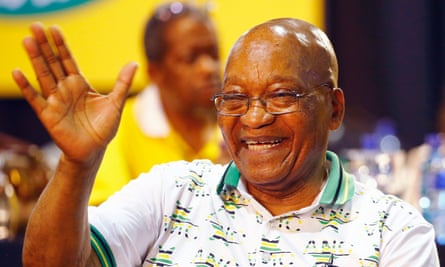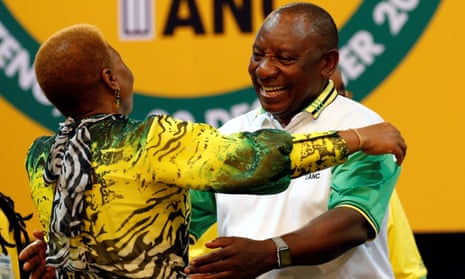Cyril Ramaphosa, an anti-apartheid activist turned tycoon and politician, has been chosen by the African National Congress as its leader for the next five years.
The battle to lead South Africa’s ruling party, which has been in power for 23 years but has been hit by declining support and a series of scandals, remained on a knife edge to the last minute.
Almost 5,000 delegates voted in an internal party election at a conference centre in Johannesburg. Ramaphosa won with 2,440 votes to 2,261 for his rival Nkosazana Dlamini-Zuma.
The delegates’ choice will almost certainly determine the next president of South Africa, due to be decided in an election in 2019, and the trajectory of the “rainbow nation” for decades to come.
The victory of Ramaphosa, 65, will come as a relief to those in South Africa who feared populist and potentially divisive policies from Dlamini-Zuma, a former senior minister and party stalwart who had promised “radical economic transformation”.
But it will disappoint those who believe Ramaphosa lacks the will to take measures needed to redistribute wealth and lift millions of people out of deep poverty.
ProfileWho is Cyril Ramaphosa?
Show

Early life
Ramaphosa was born in Soweto, a township near Johannesburg and the centre of the anti-apartheid struggle, in 1952. He became involved in activism to end the apartheid system while studying at university and was arrested in 1974, spending 11 months in solitary confinement.
End of apartheid
After graduating, he co-founded the National Union of Mineworkers, which is now one of the biggest and most powerful trade unions in South Africa. Ramaphosa was a key part of a taskforce that led South Africa's transition to democracy and is credited with being a skilled negotiator. Despite Nelson Mandela describing him as one of the most gifted leaders of the "new generation", Ramaphosa failed to get the ANC nomination to succeed Mandela as president in 1999.
Buinessman
After that blow, Ramaphosa swapped politics for a lucrative foray into business, using his union connections and becoming one of the richest men in the country. His popularity took a knock in 2012 when police shot dead 34 striking workers at a mine operated by London-listed Lonmin. At the time of the killings, Ramaphosa was on the board of directors and had called for a crackdown on the strikers, whom he accused of "dastardly criminal" behaviour.
Return to politics
In 2012 Ramaphosa returned to politics and two years later he became South Africa's deputy president. Despite being part of Zuma's administration, he is seen as a reformer who will steer the country away from the corruption scandals that have hurt the economy.
Analysts were quick to point out that several other senior positions within the ANC had gone to politicians who are unlikely to back Ramaphosa’s expected push to reform the party and crack down on corrupt patronage networks that have flourished over the last decade.
Richard Calland, an author and expert on the ANC, said Ramaphosa’s victory could prove to be pyrrhic.
As the delegates waited for the result, supporters of both candidates sang, clapped and danced, vying for the loudest, most resonant chants.
An hour after the ANC’s electoral cell was due to take the stage – beneath a huge banner bearing the slogan “towards unity, renewal and radical socioeconomic transformation” – Ramaphosa and Jacob Zuma, the incumbent ANC leader and president of South Africa, stood to dance and sing.
Within minutes, the hall erupted with cheers from Ramaphosa’s supporters as it became clear he had won by the slender margin of 179 votes.
The two main contenders represented dramatically different styles as well as ideologies, and the choice made by the ANC’s 54th elective conference is one of the most momentous in South Africa’s recent history.
Ramaphosa, currently South Africa’s deputy president, is seen as the ANC’s best chance of retaining power in the 2019 elections. However, the failure to place allies in three key senior posts is a blow.
“The ANC will struggle to rebrand itself as a party of the progressive centre … the paradox is that Dlamini-Zuma lost but her faction won,” said Calland.
Dlamini-Zuma, 68, is an ex-wife of Jacob Zuma, who gave his final speech as ANC leader on Saturday night.

Zuma has led the ANC since 2007 and has been president of South Africa since 2009. His tenure in both posts has been controversial, with a series of corruption scandals undermining the image and legitimacy of the party that led South Africans to freedom in 1994 and has ruled ever since.
Zuma, 75, who has always denied any wrongdoing, said on Monday afternoon: “I am bowing out. I am very happy … I think from my own point of view I made my contribution.”
South Africa was a “rich country”, he said. “We have to share the wealth. We all want a good South Africa … The ANC leads for South Africa. It does not lead for itself.”
The rand extended its gains to more than 4% on Monday, reaching its highest level since March, in anticipation of a Ramaphosa win.
South Africa may now avoid a downgrade to junk status by ratings agencies, which would drastically limit investment from overseas.
But the unexpected constraints placed on Ramaphosa’s freedom of action as party president by the defeats of senior allies may make any rapid move to oust Zuma very difficult.
According to ANC traditions, even elected national presidents are subject to party discipline and can be moved to other roles by its national executive committee. Ramaphosa may lack the support within the party needed for such a move.
Siyabonga Mbokazi, an official of the Congress of South African Students, said he had voted for Dlamini-Zuma but was very pleased by the result. “It is a very balanced, very good result. We are united. The ANC is going forward. We are back on track,” Mbokazi said.
There were concerns, particularly among Ramaphosa supporters, that attempts may have been made to bribe delegates, who had been sent to Johannesburg from ANC branches all over South Africa. Each camp took measures to restrict access to loyal delegates.
The victory of the regional power brokers is evidence of a historic shift in South African politics. “This is the last generation where candidates were prisoners, prominent trade unionists or exiles. Increasingly actors have emerged from provincial politics,” said Antony Butler, professor of political studies at the University of Cape Town.
Women were less prominent, however, filling only one of the top six posts in the party. “The branches have spoken. It was a good election. But I am very disappointed at the number of women,” said Lindiwe Zulu, a minister and ANC official.
The ANC still dominates the political landscape in South Africa, but its popularity has been hit by a failure to fulfil expectations that it would transform the lives of the country’s poor. The party lost control of several cities in municipal elections last year and may be forced into a coalition after the next national election.
Gwede Mantashe, the party’s outgoing secretary general, said it was important that the ANC won back South Africa’s main cities or it would risk being “relegated to a rural party”.
“We are working for regaining the lost ground. We want a strong ANC,” he said.








